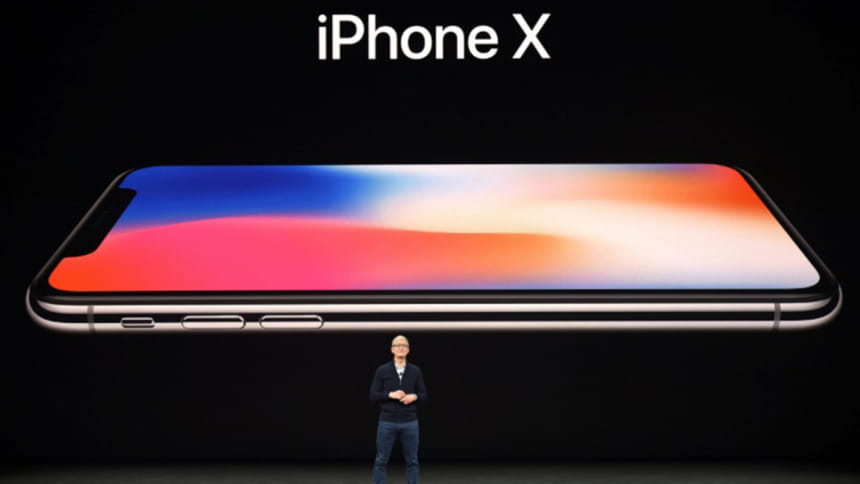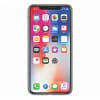First look: Apple’s luxury iPhone both copies and innovates

As soon as you see the iPhone X up close, you'll realize that it's nothing like any of the previous models that Apple has released during the past decade.
But you might notice striking similarities with some of the sleek smartphones that Samsung, Google and others have been churning out during the past year or two.
Like its rivals, Apple has finally gotten around to making a phone with an edge-to-edge display, a nod to consumers' desire for more space to view their photos, watch movies and TV shows, read books and play games.
In that sense, Apple is playing a game of catch-up with the iPhone X — a name that refers to the Roman numeral for "10." But the device still manages to live up to Apple co-founder Steve Jobs' mandate to "think different."
The iPhone X comes with what appears to be sophisticated facial recognition. On a basic level, that allows its owner to unlock the phone with a quick glance. But it also opens the door for a menagerie of emojis that can be controlled and manipulated with facial expressions and voice.
The phone also provides a spectacular canvas for photos, thanks to a superior camera and a souped-up screen Apple calls a "Super Retina" display.
It also costs almost $1,000, an unprecedented price for a mass market phone.
That price tag means that most Apple lovers will probably stick with the slightly less expensive iPhone 8 and iPhone 8 Plus, which will be available Sept. 22 — six weeks before the iPhone X hits the market.
But the iPhone X will probably be a hot commodity among status seekers and affluent consumers. Such buyers won't flinch at paying an extra $300 to own a phone with attractive but still mostly marginal improvements, based on about 20 minutes The Associated Press spent with the phone in a controlled demo room Tuesday.
One of the best things about the iPhone X: It has a larger screen, but isn't more cumbersome to carry around. The iPhone X's edge-to-edge screen measures 5.8 inches diagonally compared to 5.5 inches for the iPhone 7 Plus and now the iPhone 8 Plus. But the iPhone X's overall dimensions are smaller than the Plus and just slightly larger than the regular models. That's bound to appeal to people who like large screens but don't like oversized phones.
On the down side, the iPhone X's screen isn't as wide as that of the iPhone 7 Plus or iPhone 8 Plus.
What really makes the iPhone X stand out is its new high-resolution display, coupled with its spiffy cameras. Photos viewed on the iPhone X look amazingly vivid and lifelike, right down to the visible blades of glass at a kid's soccer game or every crease of a blanket blowing in the wind.
Emojis have become such a popular way of communication in our smartphone-driven culture that the iPhone X's "animoji" feature could prove popular as well.
This animated feature draws upon the iPhone X's facial recognition technology and high-end, front-facing camera to enable people to control the expressions on a dozen different type of emojis.
For instance, you can pull up a fox or a rabbit and it will frown or smile in sync with your own expression. The emoji figure will move its mouth when you do; record it and it will speak in your voice. (You can send such videos to friends.)
Facial recognition is also the new convenient way to unlock the iPhone X. No more fingerprint scanner: the expansion of the display meant the loss of the home button, which housed that sensor. Apple says this change will allow iPhone X owners to unlock the device with a quick glance under just about any conditions. (The device also can be unlocked with a numeric passcode if facial recognition fails, as it did for one Apple executive during Tuesday's presentation.)
But security might still be an issue, particularly if the iPhone X's facial recognition can be tricked by intruders trying to break into a device designed for big spenders and luxury lovers. Apple says it turned to mask experts to test and improve the feature, though it acknowledges that twins might trick the phone.
Using the iPhone X will also require behavioral changes, such as swiping from the bottom to get the home screen, now that the home button has disappeared. The new phone does add a button on the side to invoke the Siri virtual assistant and Apple Pay.

 For all latest news, follow The Daily Star's Google News channel.
For all latest news, follow The Daily Star's Google News channel. 








Comments